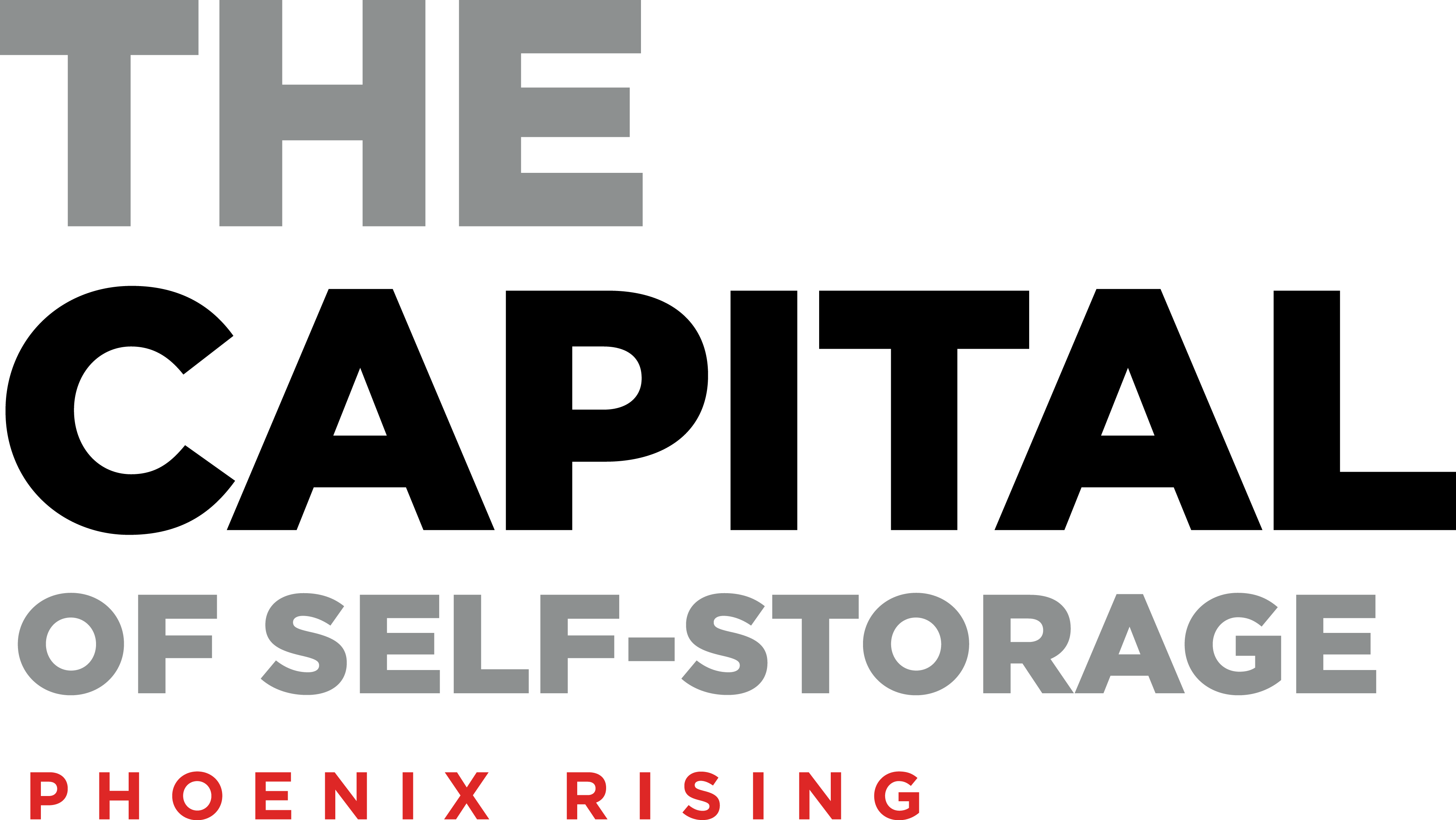

Once considered a town “in the middle of nowhere,” Phoenix was witnessing many changes in the 60s. Although Good recalls hunting in the Valley in those early days, it wouldn’t be long before developers were carving out new space for malls, museums, stadiums, golf courses, residential communities, and business parks. Approval of the 336-mile Central Arizona Project in 1968, which would bring water to 80 percent of the state’s population, made the desert state an even more attractive place to live and work.
Of course, where there’s population growth, there’s a need for storage. “I have a theory on why Phoenix became a self-storage hotspot,” offers Randy Tipton, former President of Universal Insurance. “I moved to Phoenix from upstate New York. When people like me came here, we left homes with basements and attics. You won’t find many of those in the Sun Belt states, so we had nowhere to store our stuff. Savvy entrepreneurs saw the need for storage, and the rest is history.”
U-Haul was famously founded by Leonard and Anna Mary Carty Shoen, who at one time could not find a rental trailer for a one-way move, forcing them to buy a trailer. This was the aha moment that gave birth to U-Haul, which the Shoens began in Portland, Ore. In 1967, they uprooted the business and headed to sunny Phoenix.
“No one knows exactly why they chose Phoenix, but it was a smart move,” says Russ Baldwin, director of Affiliate Networks for U-Haul. “As the population grew, so did U-Haul. The business was able to greatly expand its self-storage model.”


With an idea and $4,000, MiniCo Storage Insurance Corporation was born in 1974, offering protection for self-storage tenants’ property. A year later, Good became a founding member of the Self Storage Association or SSA; he would be inducted into its Hall of Fame in 2015. Things continued to expand from there with the launch of Mini Storage Security Co. and MiniCo Asia, Ltd. “We were self-storage pioneers in China, building four facilities. It really caught on, and in about two years, there were about 175 copycats!”
In 1979, Good began publishing the company’s free corporate newsletter, which turned into Mini-Storage Messenger. “That first year was free, but when the second year rolled around, the headline was ‘free subscriptions end!’” he laughs.
By 1985, Harry Sleighel was handling tenant insurance for Good, but he was destined for something different, eventually becoming CEO of Michaels Wilder, Inc., a marketing agency with numerous self-storage clients. Sleighel never left insurance completely behind; he also founded Tenant Property Protection, a third-party claims company that counts the Storelocal cooperative as a client.
One Arizona native, self-proclaimed “West Phoenix country boy” Troy Bix, also started at MiniCo, joining the team a year later in 1986 and working on Mini-Storage Messenger. Bix eventually left to launch his own publication, Inside Self Storage (ISS) and its annual trade show, the ISS World Expo. Today, Bix is president of Janus International’s R3 division (Restore, Rebuild, and Replace). “I have always served independents,” Bix says. “At MiniCo, we wrote a lot about how they could succeed, and at Janus, I show them how to make their facilities more current with R3 so that they’re able to compete with the big guys.”
Tipton was another MiniCo alumni, running the insurance division before moving to Universal Insurance five years later. “It was great working with Hardy [Good]. I’m proud to have been a part of it.”
Around the same time Good was launching MiniCo, another entrepreneur was entering self-storage. Bob Schoff, who graduated from the University of Arizona in 1978, found self-storage to be an interesting endeavor, but no one would hire him. “Back then they were looking for retired couples to manage properties, real ‘mom-and-pops,’” he recalls. In response to the rejection, he decided to start his own business, Tucson Self Storage, part of real estate development company The Schomac Group.
By 1974, Schoff was managing seven facilities while simultaneously working for MiniCo, coordinating sales, advertising, and accounting. Today, Schoff is not only the president and chairman of the board for National Self Storage (NSS), but he has also served as chairman on the Self Storage Association’s board of directors and is a former president of the Arizona Self-Storage Association.


In 2003, Chiti happened upon the patent owners of a self-service system that rented self-storage units and processed customer payments. “Most self-storage facilities didn’t have websites back then, and I already knew the tech business, so I saw a market for this,” recalls Chiti. He bought the patent and established OpenTech. Working out of his garage, he eventually launched the full-service INSOMNIAC® self-storage kiosk, finally realizing his vision (without the golf ball façade).

StorageTreasures was originally owned by Jim Grant, who left his hometown of Boston behind for the fairer weather of Phoenix in 1993. After developing facilities in other Sun Belt states, he waded into the online auction waters. “There was a time when a handful of the same people would show up for auctions,” recalls Grant. “But in 2011, the TV show ‘Storage Wars’ came out and was a big hit. Suddenly, hundreds of people would show up on site to place bids. It was crowded, it was hot, it was unsafe. I thought, ‘there has to be a better way.’”
Grant knew that online auctions were the answer, but at the time there were no guidelines since state auction statutes had been written in 1984, before the dawn of the internet. Still, Grant would not be dissuaded. For a while, he operated within a legal gray area to hold online auctions, and then worked with the SSA to change legislation as state statutes came up for renewal.
In 2015, Grant saw another opportunity: portable storage insurance. “PODS, Pack Rat … no one was offering insurance for portables, so I started Storage Protectors. Now, we’re one of the largest insurance providers for self-storage in general.”
“I moved to Arizona with a specific goal: to build facilities,” says Grant. “But when you see another unmet need, you pivot.”


Rudel and his family were originally living off the land in North Dakota. He attributes his knowledge of construction to farm life. “We built a lot of our own buildings. Granaries, cattle shelters … my father even built a community grocery store.”
The family eventually relocated to Phoenix, where Rudel’s father’s interest in self-storage, which had piqued his interest after seeing a facility on a trip to Florida, began to come to fruition. “However, when he went to finance the build, no one had a clue about the business. So, he decided to build it himself.”
Sadly, Rudel’s father passed away during construction, but he was determined to see the project to the finish line. “We already had a lot of sweat equity into this, so I got my contractor’s license and completed it.” Upon completion, Rudel found himself owner of only the second self-storage facility in the Valley. “It’s still there,” he says. “North Phoenix Self Storage.”
Williams’ father Ted jumped into the self-storage construction business in the 1980s. Although an accountant by trade, his dad didn’t find joy in completing audits and tax returns. “He wanted to work on something that he could point to and say, ‘I did that,’” says Williams. “So, he left accounting and went into construction, wearing all the hats, from office to shovel, so to speak.”
Williams would help out when he could, but never expected construction to be his endgame. He graduated from Arizona State University just after 9/11 and found job opportunities to be limited due to the tragedy. As a result, he turned to real estate and began making a name for himself, even landing on Realtor Magazine’s “30 Under 30” list. Despite his success, Williams was still considering his options, and that’s when he began taking a closer look at his father’s business. “I thought, ‘there’s something there.’”
Although his father had developed a solid customer base through “handshakes and honest work,” Williams recognized that there was a lot of unmet potential. “I had an entrepreneurial mind and a knack for marketing, and I knew we could expand the business. So, I said, ‘Dad, let’s partner up.’ And we grew from there.”
The father-son duo remained partners for 20-plus years, with Williams’ father just recently stepping away to enjoy retirement. Williams’ company, TLW Construction, still bears his father’s initials. “It’s a great tribute,” he says.


Does this rapid growth signal a slowdown? According to our industry vets, no. “Phoenix is still the place to be,” says Tipton. “I’ll hear people say, ‘Phoenix is oversaturated with too many facilities and vendors,’ but when you look at the continued residential and commercial growth here, I don’t think that’s true. I would not shy away from coming to Phoenix to be part of the self-storage industry. I think the opportunities are unlimited.”
“Population and density drive our business,” adds Schoff. “As long as subdivisions are going up without attics and basements, self-storage is going to thrive, and where self-storage is thriving, so will companies that cater to them.”

Adds Chiti, “Arizona is a great place for startups … There’s also a number of programs that provide tax breaks and other incentives for new businesses.”
“Arizona has so much to offer when it comes to self-storage,” Bix says. “There are great dynamics here. Young families that need space, retirees, college kids, construction companies, and contractors that need storage. Phoenix is a great place to get your feet wet, and I see green pastures ahead, especially when it comes to self-storage technologies and contactless rentals.”
“Self-storage is more lucrative than ever, so expect a lot more growth,” predicts Good. “Along with that growth, there will be new ideas. Innovators go to where the action is.”


“There’s been a real generational shift in self-storage, with young people wanting to invest or own and self-manage,” says Baldwin. “A lot of first-generation properties in Arizona are inherited, and these kids want to improve upon them, adding security, curb appeal, pest control, individually alarmed units—all the bells and whistles. And they understand that remote management is the next big business model.”
Schoff sees the changing of the guard as well. “I think Phoenix will continue to thrive, especially as obsolete first-gen facilities are replaced by the newer, Class-A outfits. We recently relocated our office, and I was amazed at the small amount of paperwork we moved compared to the last time. It was a bit of an eye-opener into how far we have come with technology under the guidance of the new generation.”
“I serve as a special advisor to the executive team at MiniCo Insurance Agency, but I’ve largely stepped away,” says Good, who’s content to let this next generation take over as he spends more time in Asia, more time sailing, and more time with his kids and grandkids.
Rudel agrees. “I’m 76, and we’ve been blessed with the three facilities we have. I don’t need to take any more risks. Instead, I’m taking the grandkids on a Mediterranean cruise for a few weeks. It’s time to go play.”
Tipton, who was about to embark on a two-month sabbatical when we spoke, has stepped back from the business as well. “My daughter Jenny [Bortman] is officially the president at Universal. I will continue coaching, training, and working on special projects, but she’s got the reins now.”
Sleighel’s daughter Shelly Anderson is also part of the next generation, having stepped into the role of CEO at Michaels Wilder. “I pitch in where I can,” Sleighel says, “but she’s been running the show for the last 10 years.”
The self-storage industry has been evolving since its inception, and change will continue as the next generation ushers in new ideas and innovations. Grant says that “the entrepreneurial spirit in Arizona is alive and well,” and by all accounts here, it appears the industry is in capable hands.

“We were the visionaries,” Good says proudly. “Myself, Randy, Troy, Lance [Comstock, who founded self-storage security company PTI Systems but was unavailable for this story] … All of us in the industry were a team and we got things done. There were less than 1,000 facilities when we started. Now there’s more than 55,000.”
“The self-storage industry is home and the people in it are our friends,” says Chiti. “We are grateful to all the industry veterans that took us under their wing. We would not be here without their support, guidance, and most of all friendship.”
“Self-storage was like a small business back then,” recalls Tipton. “We were a crew. And we still are … we keep track of one another.”
Grant agrees. “There was a great camaraderie. We were always getting together, throwing around ideas over drinks.”
Sleighel sums up his thoughts in one poignant sentence: “Some of my very best friends I’ve made in self-storage.”